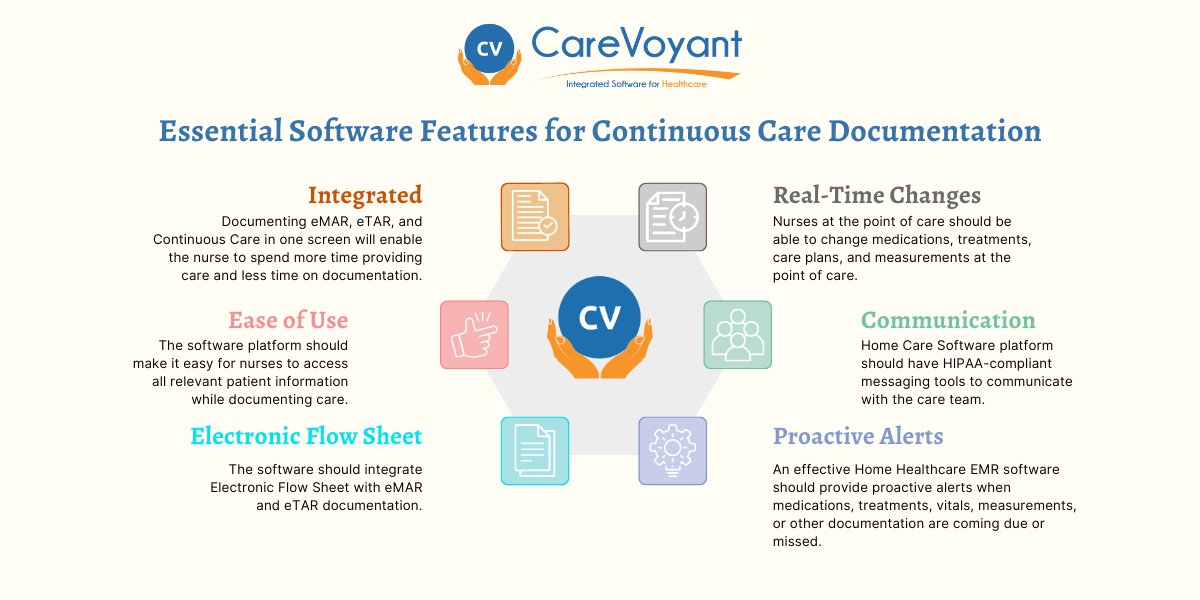Discover the must-have software features for Continuous Care Documentation in Private Duty Nursing. Improve efficiency and accuracy in Patient Records.
This blog will discuss essential features a Private Duty Home Care Software should have for Continuous Care Documentation for Home Care Agencies providing Private Duty Nursing Care.
Overview
Private Duty Nursing Home Care is skilled care provided one-on-one by a Private Duty Nurse (RN or LPN) to medically fragile adults and pediatric patients in the comfort of their homes. A patient's unique and complex health challenges require personalizing care, tailoring it to the physician-ordered Plan of Care. Private Duty Nursing home care is different from traditional home health as the service is typically provided in longer shifts, anywhere from 8 to 24 hours over a long period.
Nurses providing Private Duty Nursing care work in longer shifts providing continuous care for the same patient. They must collect and document Vitals and Measurements (Vent Settings, Trach Settings, Cough Logs, Seizure Logs, etc.) and administer medications and treatments multiple times during the shift. The demands of providing continuous care in a longer shift create unique documentation challenges for nurses and Private Duty Home Care agencies.
Continuous Care Documentation requirements create unique challenges for Private Duty Nursing Home Care Software Platforms. However, Private Duty Nursing Home Care Agencies are using a software platform designed for Home Health Care agencies providing intermittent services. This leads to significant operational inefficiencies for Private Duty Nursing Home Care agencies. A software platform should accommodate the challenges of Continuous Care Documentation for Private Duty Nursing Home Care Agencies.
Essential Software Features for Continuous Care Documentation
Private Duty Nurses continuously care for medically fragile patients with complex medical needs in long shifts. These patients usually have many medications, treatments, measurements, and other complex care needs. These patients may also depend on respiration and feeding devices, which require continuous monitoring and adjustments. Documenting the care provided while providing care adds another layer of difficulty for Private Duty Nurses.
The following are some of the essential features required in a Private Duty Nursing Home Care Software platform to document continuous care while providing quality care effectively.
1.Integrated
Private Duty Nursing Home Care Agencies' home care software platform should have built-in tools to allow the nurse to document all the care provided during the shift in one area. Documenting Medication Administration (eMAR), Treatment Administration (eTAR), and Continuous Care in one screen will enable the nurse to spend more time providing care and less time on documentation.
2.Ease of Use
Nurses providing Private Duty Nursing Care are juggling multiple critical tasks giving patients care during their shifts. They will also have to document vitals, measurements, and other care numerous times during the shift, like Vent Settings or Trach Settings. Home Care Software should make it easy for the nurses to document care multiple times during the shift. The software platform should also make it easy for nurses to access all relevant patient information while documenting care, such as demographics, past clinical notes, and schedules.
3.Configurable Electronic Flow Sheet
Patients receiving Private Duty Nursing Care have unique and complex clinical conditions. The Private Duty Nursing Software platform should have the ability to configure and personalize measurements for each patient based on the care plan and the orders from the physician. The software should also integrate Electronic Flow Sheet with eMAR and eTAR documentation.
4.Real-Time Changes
Any changes to the patient’s medication, treatment, care plan, or measurements (Vent Settings, Trach Settings, Cough Logs, Seizure Logs, etc.) should reflect at the point of care in real-time. Nurses at the point of care should be able to change medications, treatments, care plans, and measurements at the point of care.
5.Communication
Effective communication is essential in Private Duty Nursing Care to provide quality care and improve patient safety. Home Care Software platform should have HIPAA-compliant messaging tools to communicate with the care team. Communication Logs and access to communication logs will enable effective communication from one shift to the next.
6.Proactive Alerts
Patients with complex medical conditions receive Private Duty Home Care at their homes. Nurses providing care will be juggling many clinical tasks during the shift. An effective Home Healthcare EMR software should provide proactive alerts when medications, treatments, vitals, measurements, or other documentation are coming due or missed. Drug interaction alerts at the point of care will also be beneficial.
Frequently Asked Questions
-
Continuous Care Documentation refers to the real-time recording of vital signs, medication administration, treatments, and patient conditions throughout an extended nursing shift in Private Duty Home Care.
-
Unlike traditional home health, Private Duty Nursing involves long shifts and complex care needs, requiring Private Duty Nursing software with features for real-time documentation, seamless scheduling, and compliance tracking.
-
A robust Home Care Software reduces manual paperwork, automates medication tracking, enables real-time updates, and streamlines documentation, allowing nurses to focus more on patient care.
-
Essential features include an integrated eMAR & eTAR, configurable electronic flow sheets, real-time updates, HIPAA-compliant communication, and proactive alerts for medications, vitals, and treatments.
-
Real-time updates ensure that any changes in care plans, medications, or vitals are instantly reflected at the point of care, improving accuracy and patient safety.
-
Automation helps nurses by providing intelligent alerts, tracking due tasks, reducing errors, and ensuring accurate documentation of patient vitals and care history.
-
A Home Care Software platform with secure HIPAA-compliant messaging and communication logs allows seamless information exchange between nurses, ensuring continuity of care.
-
Proactive alerts notify nurses about pending documentation, upcoming medication administration, and critical vitals, helping them avoid missed tasks and ensuring timely care.
-
Yes, Home Care Software configurable electronic flow sheets allow agencies to tailor documentation based on each patient’s specific medical needs, physician orders, and care plans.
-
CareVoyant provides an all-in-one Home Care Software platform with real-time documentation, advanced scheduling, compliance tracking, and financial management tools to help agencies improve efficiency and patient care.
Conclusion
Private Duty Nursing Home Care Agencies providing care to patients at their homes should implement the right home health care software platform with the tools effectively document continuous care. CareVoyant understands the demanding needs to manage Private Duty Home Care Agencies providing skilled care for medically fragile patients while supporting other services like Non-Medical Personal Care, HCBS, and Home Health. CareVoyant Home Care software platform offers the right technology and tools to help a Private Duty Home Care Agency effectively manage the agency and improve operational efficiency and the agency's bottom line.
About CareVoyant:
CareVoyant is a leading provider of cloud-based integrated enterprise-scale home health care software that can support all home-based services under ONE Software, ONE Patient, and ONE Employee, making it a Single System of Record. We support all home based services, including Home Care, Private Duty Nursing, Private Duty Non-Medical, Home and Community Based Services (HCBS), Home Health, Pediatric Home Care, and Outpatient Therapy at Home.
CareVoyant functions – Intake, Authorization Management, Scheduling, Clinical with Mobile options, eMAR/eTAR, Electronic Visit Verification (EVV), Billing/AR, Secure Messaging, Notification, Reporting, and Dashboards – streamline workflow, meet regulatory requirements, improve quality of care, optimize reimbursement, improve operational efficiency and agency bottom line.
For more information, please visit CareVoyant.com or call us at 1-888-463-6797.
Request for Information
To learn more about CareVoyant Software and how we improve the operational efficiency of Home Healthcare Agencies, contact us:









